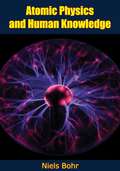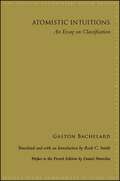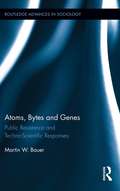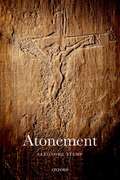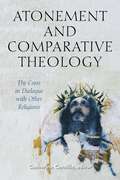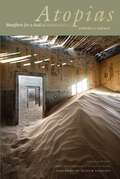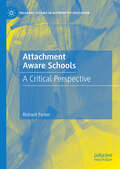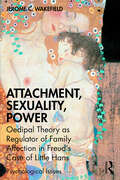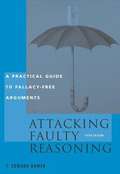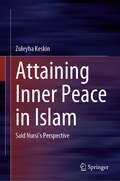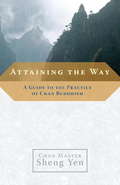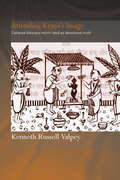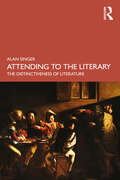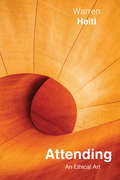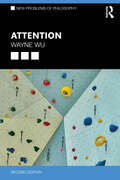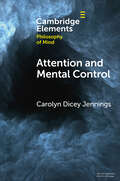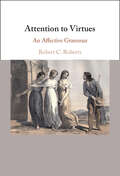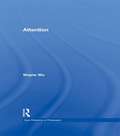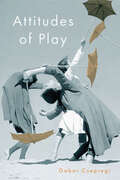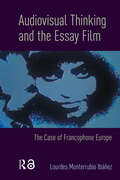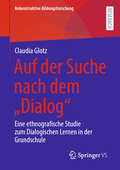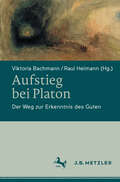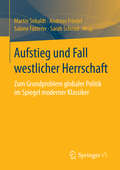- Table View
- List View
Atomic Physics and Human Knowledge (Dover Books On Physics Series #Vol. Iii)
by Niels BohrThis collection of articles, which were first published in 1958 and written on various occasions between 1932 and 1957, forms a sequel to Danish physician Niels Bohr’s earlier essays in Atomic Theory and the Description of Nature (1934).“The theme of the papers is the epistemological lesson which the modern development of atomic physics has given us and its relevance for analysis and synthesis in many fields of human knowledge.“The articles in the previous edition were written at a time when the establishment of the mathematical methods of quantum mechanics had created a firm foundation for the consistent treatment of atomic phenomena, and the conditions for an unambiguous account of experience within this framework were characterized by the notion of complementarity. In the papers collected here, this approach is further developed in logical formulation and given broader application.”
Atomistic Intuitions: An Essay on Classification (SUNY series in Contemporary French Thought)
by Gaston BachelardFrench philosopher Gaston Bachelard (1884–1962) is best known in the English-speaking world for his work on poetics and the literary imagination, but much of his oeuvre is devoted to epistemology and the philosophy of science. Like Thomas Kuhn, whose work he anticipates by three decades, Bachelard examines the revolution taking place in scientific thought, but with particular attention to the philosophical implications of scientific practice. Atomistic Intuitions, published in 1933, considers past atomistic doctrines as a context for proposing a metaphysics for the scientific revolutions of the twentieth century. As his subtitle indicates, in this book Bachelard proposes a classification of atomistic intuitions as they are transformed over the course of history. More than a mere taxonomy, this exploration of atomistic doctrines since antiquity proves to be keenly pedagogical, leading to an enriched philosophical appreciation of modern subatomic physics and chemistry as sciences of axioms. Though focused on philosophy of science, the perspectives and intuitions Bachelard garnered through this work provide a unique and even essential key to understanding his extensive writings on the imagination. Roch C. Smith's translation and explanatory notes will help to make this aspect of Bachelard's thought accessible to a wider readership, particularly in such fields as aesthetics, literature, and history.
Atoms, Bytes and Genes: Public Resistance and Techno-Scientific Responses (Routledge Advances in Sociology #126)
by Martin W. Bauer"Atom," "byte" and "gene" are metonymies for techno-scientific developments of the 20th century: nuclear power, computing and genetic engineering. Resistance continues to challenge these developments in public opinion. This book traces historical debates over atoms, bytes and genes which raised controversy with consequences, and argues that public opinion is a factor of the development of modern techno-science. The level and scope of public controversy is an index of resistance, examined here with a "pain analogy" which shows that just as pain impacts movement, resistance impacts techno-scientific mobilization: it signals that something is wrong, and this requires attention, elaboration and a response to the challenge. This analysis shows how different fields of enquiry deal with the resistance of social-psychological mentalities in the face of industrial, scientific and political activities inspired by projected futures.
Atonement (Oxford Studies in Analytic Theology)
by Eleonore StumpIn their place, she argues for an interpretation that is both novel and yet traditional and that has significant advantages over other interpretations, including Anselms well-known account of the doctrine. In the process, she also discusses love, union, guilt, shame, forgiveness,retribution, punishment, shared attention, mind-reading, empathy, and various other issues in moral psychology and ethics.
Atonement and Comparative Theology: The Cross in Dialogue with Other Religions (Comparative Theology: Thinking Across Traditions #9)
by Catherine CornilleThe central Christian belief in salvation through the suffering, death, and resurrection of Jesus Christ remains one of the most intractable mysteries of Christian faith. Throughout history, it has given rise to various theories of atonement, many of which have been subject to critique as they no longer speak to contemporary notions of evil and sin or to current conceptions of justice. One of the important challenges for contemporary Christian theology thus involves exploring new ways of understanding the salvific meaning of the cross.In Atonement and Comparative Theology, Christian theologians with expertise in Judaism, Islam, Hinduism, Buddhism, Daoism, and African Religions reflect on how engagement with these traditions sheds new light on the Christian understanding of atonement by pointing to analogous structures of sin and salvation, drawing attention to the scandal of the cross as seen by the religious other, and re-interpreting aspects of the Christian understanding of atonement. Together, they illustrate the possibilities for comparative theology to deepen and enrich Christian theological reflection.
Atopias: Manifesto for a Radical Existentialism (Lit Z)
by Frédéric NeyratThis book offers a manifesto for a radical existentialism aiming to regenerate the place of the outside that contemporary theory underestimates. Neyrat calls this outside “atopia”: not utopia, a dreamt place out of the world where everything would be perfect, but atopia, the internal outside that is at the core of every being. Atopia is neither an object that an “object-oriented ontology” would be able to formalize, nor the matter that “new materialisms” could identify. Atopia is what constitutes the existence of any object or subject, its singularity or more precisely its “eccentricity.” Etymologically, to exist means “to be outside” and the book argues that every entity is outside, thrown in the world, wandering without any ontological anchor. In this regard, a radicalized existentialism does not privilege human beings (as Sartre and Heidegger did), but considers existence as a universal condition that concerns every being.It is important to offer a radical existentialism because the current denial of the outside is politically, and aesthetically, damaging. Only an atopian philosophy—a bizarre, extravagant, heretic philosophy—can care for our fear of the outside. For therapeutic element, a radical existentialism favors everything that challenges the compact immanence in which we are trapped, losing capacity to imagine political alternatives. To sustain these alternatives, the book identifies the atopia as a condition of the possibility to break immanence and analyze these breaks in human and animal subjectivity, language, politics and metaphysics.
Attachment Aware Schools: A Critical Perspective (Palgrave Studies in Alternative Education)
by Richard ParkerThis book offers a unique exploration of attachment aware schools, bringing together empirical teacher views along with wider theoretical and policy perspectives. Attachment aware schooling demonstrates an understanding of the emotional and behavioural needs of children and young people which go beyond training and experience, in order to promote better learning and health outcomes. The author reviews the key principles of attachment theory, the features of attachment aware schools and the tensions that exist in current education policy in England. He then explores issues around gender, social justice and social policy in relation to trauma-informed and attachment aware practice. The book will be of interest to academics and students in the fields of alternative education, the sociology of education, education policy and social psychology.
Attachment, Sexuality, Power: Oedipal Theory as Regulator of Family Affection in Freud’s Case of Little Hans (Psychological Issues)
by Jerome C. WakefieldIn Attachment, Sexuality, Power, Jerome C. Wakefield challenges established views of Freudian psychoanalysis by applying Foucault’s concept of ‘power/knowledge’ to Freud’s case of Little Hans, illuminating the role that Oedipal theory has played in reorganizing intimate family relationships. Combining close examination of the Hans case with accounts of the history of marriage and psychology of co-sleeping, this book argues that the Oedipal theory achieved prominence because its implications for family dynamics supported changing social values. Wakefield identifies a previously overlooked reason for Hans’s anxiety—his father attempted to protect Hans from his supposed Oedipal desires by separating Hans from his mother. Thus, Wakefield argues, the father’s exercise of power based on his belief in Oedipal theory, not an actual Oedipus complex, caused Hans’s vulnerability to anxiety—revealing the theory’s potential to cause harm by distancing children from their parents, even as such distancing made the theory socially appealing. This book’s novel and carefully documented articulation of the mechanisms of power by which Oedipal theory exerts its influence on family life will be of interest to psychoanalysts and psychotherapists alike, and essential for scholars in the fields of psychoanalysis, philosophy of science and the history of psychiatry.
Attaining Inner Peace in Islam: Said Nursi’s Perspective
by Zuleyha KeskinThis book discusses inner peace from an Islamic theological and spiritual perspective, the writings of Said Nursi, a twentieth century Muslim scholar. Inner peace is a topic of great interest in the world at present. While happiness and mental health have been extensively discussed from a psychological and sociological perspective, and while inner peace has been written about from various religious viewpoints, there is very little scholarly work on inner peace from an Islamic theological and spiritual perspective. This book addresses this significant gap. With Islam being the second largest religion in the world, this book provides an important contribution to the literature on a faith tradition which is followed by so many. In addressing the intersection between Islam, spirituality and psychology, this book makes an original contribution to the literature on modern Islamic thinkers like Nursi, and to the broader fields of Islamic studies, and theology, philosophy and well-being studies.
Attaining the Way: A Guide to the Practice of Chan Buddhism
by Master Sheng YenThis is an inspiring guide to the practice of Chan (Chinese Zen) in the words of four great masters of that tradition. It includes teachings from contemporary masters Xuyun and Sheng Yen, and from Jiexian and Boshan of the Ming Dynasty (1368-1644). Though the texts were written over a period of hundreds of years, they are all remarkably lucid and are perfect for beginners as well as more advanced practitioners today. All the main points of spiritual practice are covered: philosophical foundations, methods, approaches to problems and obstacles--all aimed at helping the student attain the way to enlightenment.
Attending Krishna's Image: Chaitanya Vaishnava Murti-seva as Devotional Truth (Routledge Hindu Studies Series)
by Kenneth Russell ValpeyThere is a steady and growing scholarly, as well as popular interest in Hindu religion – especially devotional (bhakti) traditions as forms of spiritual practice and expressions of divine embodiment. Associated with this is the attention to sacred images and their worship. Attending Krishna's Image extends the discussion on Indian images and their worship, bringing historical and comparative dimensions and considering Krishna worship in the context of modernity, both in India and the West. It focuses on one specific worship tradition, the Chaitanya Vaishnava tradition of the fourteenth to sixteenth centuries, as it develops and sustains itself in two specific locales. By applying the comparative category of ‘religious truth’, the book provides a comprehensive understanding of a living religious tradition. It successfully demonstrates the understanding of devotion as a process of participation with divine embodiment in which worship of Krishna’s image is integral.
Attending to the Literary: The Distinctiveness of Literature
by Alan SingerAttending to the Literary: The Distinctiveness of Literature is a foray into current debates about the nature of the literary. What is literary? Is literarity a thing? Are there still aesthetic standards of taste? Is the category of literary aesthetics an obstacle to understanding the uses of literature? What does it mean to count the reading of literature as an experience in its own right? What would be the deficits to human experience without literature? Attending to the Literary addresses all of these questions with a view to challenging the notion of literarity as merely representative of experience. On the contrary, Alan Singer shows how literarity is an enacting of experience. Through close readings of an eclectic repertoire of literary sentences – culled from the genres of fiction, poetry, and drama – Singer demonstrates how syntax stages human capacities for attending ever more consequentially to the world of practical experience. These stagings of forms of attention involve readers in the drama of reason-giving and expand the possibilities of rational imagination. Attending to the Literary speaks to a broad audience of readers for whom the question "Does literature matter?" remains an urgent intellectual challenge.
Attending: An Ethical Art (McGill-Queen's Studies in the History of Ideas #82)
by Warren HeitiAttending – patient contemplation focused on a particular being – is a central ethical activity that has not been recognized by any of the main moral systems in the European philosophical tradition. That tradition has imagined that the moral agent is primarily a problem solver and world changer when what might be needed most is a witness.Moral theory has been agonized by dualism – motivation is analyzed into beliefs and desires, descriptions of facts and dissatisfactions with them, while action is represented as an effort to lessen dissatisfaction by altering the empirical world. In Attending Warren Heiti traces an alternative genealogy of ethics, drawing from the Platonism recovered by Simone Weil and developed in the work of Iris Murdoch, John McDowell, and Jan Zwicky. According to Weil, virtue is knowledge, knowledge is embodied, and the knower is nested in an ecosystem of relationships. Instead of analyzing and solving theoretical problems, Heiti aims to clarify the terrain by setting up objects of attention from more than one discipline, including not only philosophy but also literature, psychology, film, and visual art.The traditional picture captures one important type of ethical activity: faced with a moral problem, one looks to a general rule to furnish the solution. But not all problems conform to this model. Heiti offers an alternative: to see what is needed, one attends to the particular being.
Attention (New Problems of Philosophy)
by Wayne WuWayne Wu’s Attention was the first book to provide a systematic overview and assessment of different empirical and philosophical works on attention. In this revised and expanded second edition Wu discusses the following central topics and problems: the nature of attention and the structure of the theory of attention. explanatory integration of the psychology and neuroscience of attention. attention’s intimate relation to agency. attention and memory. the phenomenology of attention and attention as a gate on consciousness. introspective attention of consciousness. skill in attention. the epistemology and ethics of attention. attention in thought. Updated throughout, this edition includes new chapters on working memory, automaticity and skill, and attention and ethics. The breadth of coverage provides materials for advanced students and researchers in psychology, cognitive science, and philosophy. Additional features include chapter summaries, a glossary, and suggestions for further reading, making this also an ideal introduction for those new to attention.
Attention and Mental Control (Elements in Philosophy of Mind)
by Carolyn Dicey JenningsMental control refers to the ability to control our own minds. Its primary expression, attention has become a popular topic for philosophers in the past few decades, generating the need for a primer on the concept. It is related to self-control, which typically refers to the maintenance of preferred behavior in the face of temptation. While a distinct concept, criticisms of self-control can also be applied to mental control, such as that it implies the existence of an unscientific homunculus-like agent or is not a natural kind. Yet, as this Element suggests, a scientifically-grounded account of mental control remains possible. The Element is organized into five main sections, which cover the concept of mental control, the relationship between mental control and attention, the phenomena of meditation and mind-wandering, attention deficit hyperactivity disorder, and emergence-based accounts of mental control, including an original account by the author.
Attention to Virtues: An Affective Grammar
by Robert C. RobertsIn Attention to Virtues, Robert C. Roberts offers a view of moral philosophical inquiry reminiscent of the ancient Greek concern that philosophy improve a practitioner's life by improving her character. The book divides human virtues into three groups: virtues of caring (generosity and truthfulness, for example, are direct, while justice and the sense of duty are indirect), enkratic virtues (courage, self-control), and humility, which is in a class by itself. The virtues are individuated by their conceptual structure, which Roberts calls their 'grammar.' Well-illustrated accounts of generosity, gratitude, compassion, forgivingness, truthfulness, patience, courage, justice, and a sense of duty relate such traits to human concerns and the emotions that express them in the circumstances of life. The book provides a comprehensive account of excellent moral character, and yet treats each virtue in enough detail to bring it to life.
Attention, Shoppers!: American Retail Capitalism and the Origins of the Amazon Economy (Princeton Studies in American Politics)
by Kathleen ThelenHow large American retailers outgrew the capacity of government to regulate themThe United States is widely recognized as the quintessential consumer society, one where huge companies like Walmart and Amazon are famous for enticing customers with cheap goods and speedy delivery. Attention, Shoppers! traces the origins and evolution of American retail capitalism from the late nineteenth century to today, uncovering the roots of a bitter equilibrium where large low-cost retailers dominate and vast numbers of low-income families now rely on them to make ends meet.Offering a comparative perspective on the history of American political economy, Kathleen Thelen shows how large-scale retailers in the United Kingdom, Germany, Denmark, and Sweden faced a far less hospitable regulatory environment than companies in the United States, which enjoyed judicial forbearance and often active government support. As American companies grew in scale and scope, they assembled an ever-expanding political coalition that could be weaponized to head off regulatory efforts, leveraging their market strength to squeeze suppliers and workers and even engaging in outright rule breaking when they encountered resistance.Placing the rise of the Amazon economy in a broader comparative-historical context, Attention, Shoppers! reveals how large discount retailers have successfully exploited a uniquely permissive regulatory landscape to create a shopper&’s paradise built on cheap labor and mass consumption.
Attention: Philosophical And Psychological Essays (New Problems of Philosophy)
by Wayne WuAttention is a fundamental feature of the mind yet has languished in the backwaters of philosophy. Recent years, however, have witnessed a resurgence of philosophical interest in attention, driven by recognition that it is closely connected to consciousness, perception, agency, thought, justification and introspection. As is becoming clear, attention has a rich philosophical significance. This is the first book to provide a systematic overview and assessment of different empirical and philosophical aspects of attention. Wayne Wu discusses the following central topics and problems: major experiments and theories of attention in psychology since the 1950s the neuroscience of attention, including basic mechanisms and models attention’s intimate relation to agency the phenomenology of attention attention as a gatekeeper for consciousness attention as the basis for perception-based thought about objects the role of attention in the justification of belief attention in introspection of consciousness. A key feature of the book is its skilful analysis of the empirical work on attention, and how this relates to philosophy. Additional features include chapter summaries, annotated further reading and a glossary, making this an ideal starting point for anyone studying attention for the first time, as well as being suitable for more advanced students and researchers in psychology, cognitive science, and philosophy.
Attitudes of Play
by Gabor CsepregiPlay is not only a kind of activity, but also a set of attitudes. We may join a card game in a casino without assuming a play attitude; conversely we may transform a seemingly tedious action, such as a walk to the store, into a pleasant experience of spontaneous movements by adopting an attitude of play. Attitudes of Play is a comprehensive study of the persistent human tendency to bring a cheerful and good-humoured outlook to any kind of situation, including the serious and the mundane. Gabor Csepregi offers a phenomenological description of forms of playfulness, showing how, time and again, our attitudes of play redefine and shape diverse activities and experiences – from teaching, healing, or worshipping to political conflict or walking down the street. With play attitudes, we exercise our freedom to colour these scenes or give them an altogether new form, evoking in us more refined sentiments and more acute perceptions.This book seeks to distinguish play activities from attitudes of play, showing that the latter hold value not merely for their educational or other instrumental benefits but also, and perhaps most importantly, for the overall fulfillment and well-being they offer in all stages of human existence.
Audiovisual Thinking and the Essay Film: The Case of Francophone Europe
by Lourdes Monterrubio IbáñezFrom a semio-pragmatic perspective and drawing on an interdisciplinary and intermedial approach, this book analyses how the audiovisual thinking process manifests itself in essay films. It explores how issues of subjectivity and identity, whether individual, social, political or cultural, prompt thought through the medium of cinema. The volume discusses the European Francophone essay film from its first appearance in cinematic modernity to the present. The study is developed in three stages. The first analyses the intermedial forms that are used: the letter, the (self-)portrait, the dialogue, the diptych, etc. The second examines the audiovisual materials that are mobilised. The third addresses the audiovisual procedures that are generated. In its analysis of works by Marker, Godard, Akerman, Varda and others, this book offers a new and detailed understanding of the production, evolution and achievements of the essay film in Francophone Europe.
Auf der Suche nach dem „Dialog“: Eine ethnografische Studie zum Dialogischen Lernen in der Grundschule (Rekonstruktive Bildungsforschung #49)
by Claudia GlotzGut gemeinte theoretische Abhandlung oder unmittelbare Bereicherung für die Praxis? Für Lehrer*innen steht eine Vielzahl von didaktischen Vorschlägen zur Strukturierung des Unterrichts zur Verfügung. Ein Beispiel ist das Dialogische Lernen nach Urs Ruf und Peter Gallin. Claudia Glotz rekonstruierte in ihrer ethnographisch angelegten Studie die Umsetzung des Konzepts im Unterrichtsalltag. Dabei analysierte sie aus Sicht der Lehrpersonen und Lernenden sowohl Potentiale als auch Grenzen dieser Umsetzung. Die Ergebnisse lassen sich direkt mit der Unterrichtspraxis verknüpfen und regen zum Nachdenken über das eigene Handeln an.
Aufarbeitung des an Sinti und Roma begangenen Unrechts in der Bundesrepublik Deutschland: Grundlagenkonzept für eine Wahrheitskommission
by Marc Buggeln Sebastian Lotto-KuscheMarc Buggeln und Sebastian Lotto-Kusche legen mit dieser Publikation ein Grundlagenkonzept zur Wahrheit über das begangene Unrecht an den Sinti_ze und Rom_nja in der Bundesrepublik Deutschland und der DDR vor. Zunächst fassen die Autoren den Erkenntnis- und Forschungsstand zur Geschichte von Sinti_ze und Rom_nja nach 1945 in beiden deutschen Staaten zusammen. Daraus abgeleitet wird der Forschungsbedarf und mögliche Fragestellungen der einzurichtenden Wahrheitskommission zur Aufarbeitung des an Sinti_ze und Rom_nja begangenen Unrechts (WASRU). Da Wahrheits- und Versöhnungskommissionen in Deutschland bislang keine Tradition haben und meist im unmittelbaren Übergangsbereich von Diktaturen und Apartheidsregimen hin zu Demokratien gegründet wurden, werten die Autoren die Erfahrungen dieser Kommissionen in unterschiedlichen Staaten weltweit aus.
Aufstieg bei Platon: Der Weg zur Erkenntnis des Guten
by Viktoria Bachmann Raul HeimannIst der Mensch schon so, wie er ist, gut? Oder muss er sich erst darum bemühen, es zu werden? Um gut sein zu können, bedarf es der Erkenntnis dessen, was gut ist – und der Einsicht, dass man diese Erkenntnis nicht schon hat. Das kennzeichnet die sokratische Position in den platonischen Dialogen. Entgegen gängiger Deutung ist dieses sokratische Nichtwissen aber nicht Ausdruck von Skepsis, sondern Grundvoraussetzung für den Weg zur Erkenntnis. Diesen Erkenntnisweg, den Aufstieg, schildert Sokrates im platonischen Werk nicht nur, vielmehr führt er ihn auch vor: im Tugenddialog. Ausgehend von dieser für die Platonforschung ungewöhnlichen These sichten die Autoren des Bandes das Werk Platons noch einmal mit neuem Blick. Diese Perspektive bestimmt den Aufbau des Bandes, der zentrale platonische Texte vom Tugenddialog her deutet: die Darstellung seines Vollzugs im Frühwerk, dessen Reflexion im Mittelwerk sowie die Voraussetzungen und Resultate des Aufstiegs auch im Spätwerk. Ein Ausblick in den Neuplatonismus zeigt, dass dessen mystisch-religiöse Umdeutung des Aufstiegs den für Platon entscheidenden Aspekt schon früh verliert: die Transformation des Menschen im Tugenddialog.
Aufstieg und Fall westlicher Herrschaft: Zum Grundproblem globaler Politik im Spiegel moderner Klassiker
by Martin Sebaldt Andreas Friedel Sabine Fütterer Sarah SchmidDer Sammelband analysiert Aufstieg und Fall westlicher Herrschaft als globales Grundproblem. Durch die Vorstellung von zwölf modernen Klassikern zu diesem Thema, die sich durch besonderen theoretischen und empirischen Mehrwert auszeichnen, wird die Vielfalt der Erklärungsansätze erschlossen. Diese setzen sowohl bei geographischen und natürlichen Ressourcen an, wie auch bei kulturellen Errungenschaften und Werten. Wieder andere stellen Institutionen und Organisationsmuster als entscheidende Determinanten heraus. Letztlich wird damit deutlich, dass Aufstieg und Fall westlicher Herrschaft nur multikausal zu begreifen sind. Die vergleichende Abschlussbetrachtung liefert dafür einen systematischen Ansatz.
